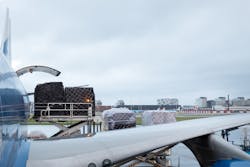Post-Brexit Cargo Handling Requirements
The exit of Britain from the European Union (EU) in early 2020 was a historic event. It happened, however, that the COVID-19 pandemic hit approximately at the same time, and it is therefore difficult to assess the impact of Brexit on the aircraft ground handling business.
According to Jude Winstanley, UK and Ireland managing director at Swissport, Brexit is just one of several significant challenges the aviation sector has faced in recent times.
“At Swissport we are immensely proud of the resilience and professionalism of our employees, and we have focused on strengthening collaborative relationships with our customers to adapt to ongoing change, particularly in response to the COVID-19 pandemic,” he says.
Overall, Brexit has not had a noticeable effect on the ground handling market, says Miguel Gomez, executive vice president Europe at Menzies Aviation.
“In the lead up to Brexit, there was a difficult labor market in Europe. We were hoping that Brexit would have a positive impact on this, with people returning home from the UK to markets where there were low unemployment rates, however, it is hard to fully understand Brexit’s direct impact with COVID-19 following just 40 days after and overshadowing it,” he observes.
Impact on Cargo
Immediately post-Brexit, in the early part of 2020, there were some challenges with cross-border trucking operations as new customs regulations came into force, according to Robert Fordree, executive vice president cargo at Menzies.
“However, this has largely settled down now. We also saw an increase in flight operations from Europe as many carriers sought to avoid congestion, as well as customs clearance confusion and complexities,” he says.
The effect that has materialized in more recent times has been the shortage of heavy goods vehicle (HGV) drivers as European Union drivers return to their home countries, observes Fordree.
“This has impacted collections and deliveries at our facilities as well as our ability to recruit new employees as cargo volumes continue to rise. We expect a return to a traditional ‘Christmas peak’ of cargo activity this year and are busy planning our labor resource to manage this expected significant upturn in volumes,” he says.
On the continent, officials at Widerøe Ground Handling (WGH) of Norway currently does not see any direct changes due to Brexit.
“As of now, international traffic has been low, and we do not anticipate any significant changes due to Brexit in Norway. Widerøe Airline has operated the Bergen-Aberdeen flights during the COVID-19 pandemic with some increase in cargo, but mainly the route has been operated due to passengers working in the oil and energy industry and on supplier ships,” say officials at WGH.
Post-Brexit Differences
In the direct aftermath of Brexit, Menzies noticed UK companies setting up entities in the continent to ease the transfer of goods, as it had become quite cumbersome, says Gomez.
“However, there have not been any noticeable changes to the ground handling sector post-Brexit. For us, changes in import and export duties and tax have made us more conscious about the movement of goods to and from the UK, causing us to carefully consider the equipment and materials purchased for our UK business,” he says.
Before Brexit, Widerøe Airline carried and handled a significant amount of lobster cargo from the UK.
“One change post-Brexit has been that with the UK leaving the EU all food imports must be approved by the Norwegian Food Safety Authority, the latter is not the case for food import from the EU and the European Economic Area (EEA),” say WGH officials. “The Norwegian Food Safety Authority is located in Oslo and provides no service in Bergen, and therefore food imports sent from Aberdeen onto Bergen cannot be ‘declared’. Hence, there is no lobster cargo directly from the UK to Bergen anymore. In addition, all UK cargo now must file a T1 shipping note, so additional work is required.”
Industry Developments
According to Gomez, there have not been any ground handling developments which have halted because of Brexit.
“The UK Export Finance is making efforts to increase exports, as they were prior to Brexit,” he says. “Comparably, COVID-19 has had a bigger impact on the industry. However, as travel restrictions ease and we begin to enter, what we hope is the post-COVID-19 era in Europe, transformation is picking up pace again.”
Swissport has taken Brexit as an opportunity to bring more innovation to its ground handling services.
“This includes our Cargospot cargo app, developed by CHAMP Cargosystems, which allows Swissport to record every step of the warehousing process, such as acceptance, build-up, check-in of goods and delivery,” says Winstanley. “With these process steps in the future supported with real-time visibility, customers can keep track of their shipment status according to Cargo iQ standards. The cargo app will enable Swissport workers to monitor and steer the warehousing process with real-time visibility, in a user-friendly and highly efficient way and offers advanced data-insights into air cargo flows.”
New Procedures and Requirements
The post-Brexit new normal is already a reality, according to Fordree.
“We have a clear understanding of customs requirements and associated processes and procedures,” he says. “Most stakeholders involved in cross-border cargo transportation have adjusted, and the compliance related challenges of Brexit are largely resolved. What remains as a significant challenge is the unintended consequences of labor shortages exacerbated by the pandemic.”
According to WGH officials, time will tell when the rest of the world and more specifically the ground handling industry will return to a normal situation.
“Will this be similar to pre-Brexit, and pre-COVID-19? We are not aware of any industry developments that have been put on hold due to Brexit,” say WGH officials. “On a more general basis, we can say that there has been increase in the amount of cargo handling. The pandemic has probably had a greater impact than what Brexit has caused.”
“Structural changes were already taking place, from digitalization to artificial intelligence (AI)-supported tools and arguably these have been accelerated by the pandemic rather than Brexit,” says Winstanley.
What the aircraft ground handling industry has learned from both Brexit and the COVID-19 pandemic is that, in a dynamic market and regulatory environment, close cooperation between regulators and industry bodies and flexible collaboration models between airports, airlines and service companies are of paramount importance, says Warwick Brady, chief executive officer (CEO) of Swissport.
“We are excited for the opportunities presented by closer collaboration with our industry partners and are ready and able to play a central role in the continued sector recovery,” he says. “We are working through an ambitious program, building Swissport into a more efficient, agile and digitally savvy business to consolidate our position as the global sector leader, knowing that our sector has demonstrated once again that it can meet the toughest challenges head on.”
About the Author

Mario Pierobon
Dr. Mario Pierobon provides solutions in the areas of documentation, training and consulting to organizations operating in safety-sensitive industries. He has conducted a doctoral research project investigating aircraft ground handling safety. He may be reached at [email protected].
